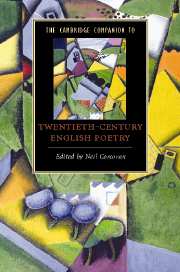4 - Fateful forms: A. E. Housman, Charlotte Mew, Thomas Hardy and Edward Thomas
from Part II - Moderns
Published online by Cambridge University Press: 28 January 2008
Summary
In their formally patterned styles and rural sympathies, the poets in this chapter are usually understood as a more traditional alternative to the metropolitan Modernism of Eliot and Pound. But rather than judge poetry on a scale of progression, it is perhaps more illuminating to ask what those styles enabled each poet to say which could not be said in the Modernists' freer or more fragmented forms. Each poet deals with division and constraint, in some way, whether it is the sense of despairing Fate for Hardy and Housman, or the mind's own differences from itself in Mew and Thomas. Each, too, ironises conventions of rural idyll to express their sense of being haplessly at odds with the social world. As such, they have been as powerful an influence on post-1950 British poetry as the Modernists, who for their part generally respected this distinctive poetry when they knew it. If Pound could name Hardy one of his greatest influences, then it should be possible to explore why this poetry, too, has its meaning and moment in the upheavals and uncertainties of the twentieth century.
Fastidious, venomously critical and glacially silent to all but a few, A. E. Housman (1859-1936) was no one's idea of a hedonist. But this is what he called himself late in life, when he seems to have thawed enough to think it worthwhile patiently correcting for posterity a young American correspondent, Houston Martin, who had called his verse the work of a Stoic pessimist:
In philosophy I am a Cyrenaic or egoistic hedonist, and regard the pleasure of the moment as the only possible motive of action. As for pessimism, I think it almost as silly, though not as wicked, as optimism. George Eliot said she was a meliorist; I am a pejorist, and also yours sincerely A. E. Housman.
- Type
- Chapter
- Information
- Publisher: Cambridge University PressPrint publication year: 2007
- 2
- Cited by

